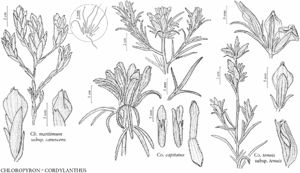familyOrobanchaceae
genusChloropyron
speciesChloropyron maritimum
subspeciesChloropyron maritimum subsp. canescens
Chloropyron maritimum subsp. canescens
Syst. Bot. 34: 188. 2009.
Common names: Alkali bird's-beak
Selected by author to be illustratedEndemic
Basionym: Cordylanthus canescens A. Gray Proc. Amer. Acad. Arts 7: 383. 1868
Synonyms: C. maritimus subsp. canescens (A. Gray) T. I. Chuang & Heckard
Treatment appears in FNA Volume 17. Treatment on page 667.
Revision as of 18:27, 24 September 2019 by FNA>Volume Importer
Stems 15–40 cm, canescent, villous, hairs spreading; branches erect or ascending, distals overtopping central spike. Leaves 15–30 mm. Spikes: bract margins entire or distally 2-toothed. Flowers: corolla tube and abaxial lip white to pale pink, galea yellow to yellow-green. Seeds 25–40, 1–1.5 mm. 2n = 30.
Phenology: Flowering Jun–Sep.
Habitat: Inland alkaline flats.
Elevation: 600–1900 m.
Distribution
Calif., Nev., Oreg., Utah.
Discussion
Subspecies canescens is the most widespread of the subspecies. Plants are always erect and have ascending branches. The stems are villous with conspicuous, straight, spreading white hairs.
Selected References
None.
Lower Taxa
None.
